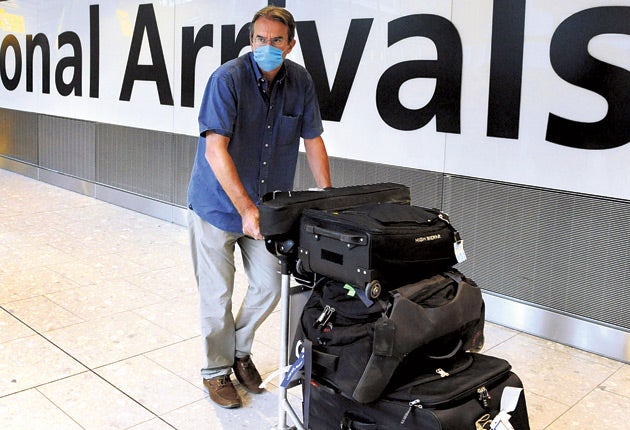Students get anti-viral drugs after another flu outbreak
Eighth victim is confirmed in Britain

Three new cases of swine flu were confirmed in Britain yesterday as the virus continued to spread around the world.
Holland and Switzerland confirmed their first cases, bringing the total of countries affected to 11. The World Health Organisation said it was renaming the flu "H1N1", a reference to its sub-type, after receiving complaints about the use of "swine" flu. On Wednesday the agency raised its alert level to Phase 5 (out of 6), indicating that a pandemic was "imminent".
The Health Protection Agency (HPA) said the three new cases were in people recently returned from Mexico, as had the five already identified, bringing the UK's total confirmed cases to eight. Two of the new cases were in London. The third was a woman from Newcastle who fell ill after flying back from a holiday in Cancun.
Her employer, Procter & Gamble, said she had had been in the office for a short time and there was little chance of anyone else being infected. Six colleagues and two students at Newcastle University, with whom she shared a house, have been given anti-viral drugs.
The HPA said 230 suspected cases were being investigated. So far there has been no confirmed cases of person-to-person transmission within the UK. But last night it emerged that a friend of Iain and Dawn Askham – the honeymoon couple who became Britain's first confirmed cases – had tested positive for a similar infection. He is now awaiting further trials. The Askhams, who were discharged from hospital yesterday, also said that five men sitting close to them on their flight home from Cancun, Mexico, appeared to be, "sweating and in a fever".
In Spain, officials said the first confirmed case in a person who had not been to Mexico was a man who apparently got the infection from his girlfriend, who had recently returned from the country. His is the only case to date of person-to-person transmission outside North America.
In the US, the number of confirmed cases passed 100 as the virus reached 15 states. Scores of schools have been closed as a precaution or as infected children have been identified but the Government has resisted calls to close the Mexico border.
Anne Schuchat, of the US public health agency the Centre for Disease Control and Prevention, told a congressional hearing the main objective should be to try to halt the spread of the virus. So far most US cases were recovering without even needing medical care.
In Mexico, President Felipe Calderon drove home the same message in a televised address. He called for a partial shutdown of the country by businesses not essential to the economy. Schools, restaurants, nightclubs and public events in Mexico City have already been closed.
There have been 176 suspected deaths from the virus in Mexico and 2,955 suspected cases. Confirmed cases following tests rose from 26 to 99 and the number of confirmed deaths rose from seven to eight.
The International Monetary Fund warned that the economic impact of the virus could be drastic in some countries, hitting tourism. Health experts said the virus could already have spread into countries with less developed surveillance systems and remained undetected.
Richard Coker, Professor of Public Health at the London School of Hygiene and Tropical Medicine, writing for BMJ Online, said poorer countries were most vulnerable because they had underdeveloped health systems, few anti-viral drugs and were likely to be at the end of the queue for a vaccine.
The WHO said the global total of confirmed cases had risen from 148 to 257. It said it was releasing some of its stockpile of anti-viral drugs for use by developing countries.
Virus spans the globe
Yesterday the World Health Organisation raised its flu level warning to five, one short of a full pandemic, as further cases were reported around the world:
Mexico: 2,500 suspected cases and 168 suspected deaths, but only eight confirmed.
US: One death and at least 109 confirmed cases.
UK: Eight confirmed, after two more people contracted the flu in London and another was recorded in Newcastle.
New Zealand: Three confirmed and 13 probable cases.
Canada: 19 confirmed.
Spain: 10 confirmed, one of which was reported by a woman who had not visited Mexico, proving that the virus can spread between humans.
Germany: Three confirmed.
Israel: Two confirmed.
Republic of Ireland: One confirmed case in a man who recently returned home from Mexico.
Switzerland: One confirmed.
Austria: One confirmed.
Peru: One confirmed case, a woman from Argentina.
Costa Rica: Two confirmed.
Netherlands: One confirmed.
Brazil: 20 suspected.
Chile: 24 suspected.
Subscribe to Independent Premium to bookmark this article
Want to bookmark your favourite articles and stories to read or reference later? Start your Independent Premium subscription today.

Join our commenting forum
Join thought-provoking conversations, follow other Independent readers and see their replies